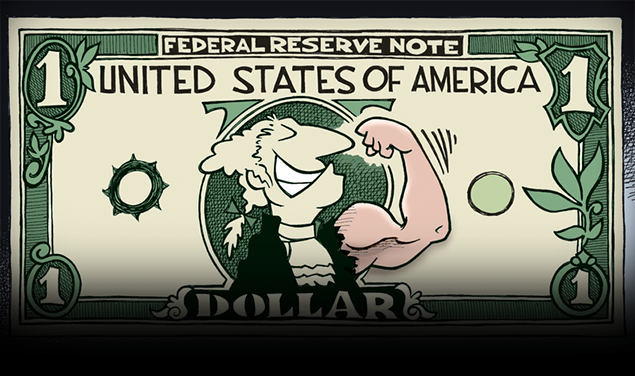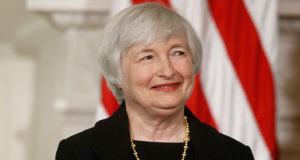The Almighty Dollar

Economists can argue ad nauseam about the “causes” of inflation. But when it’s all said and done, two major forces cannot be denied:
1). Cost-Push Inflation – Occurs when the cost of doing business rises (taxes, wages, raw materials, etc) and causes an increase in the cost of a company’s end-product, in order to maintain profit margin.
2). Demand-Pull Inflation – Occurs when too much money is available to buy too few goods.
Both of these forces are and have been affecting our economy and the Fed knows it. That’s why they’ve become so adamant about beginning an interest rate increase in advance of an onset of inflation, in an attempt to stave off potentially explosive, upward spiraling inflation and stagnation. But the reality is that the low rates have already been held for too long and they’ll be chasing inflation shortly, regardless. Worse than that is the fact that instead of using the low rate “cheap money” for expansion projects and setting up for the future growth of the company, CEO’s have been using the money to buy back company stock, which makes the company look good on paper, increases stock value, and allows stockholders and executives alike to line their pockets with profits, unfortunately it leaves the company as a worthless shell of its former self and incapable of jump-starting into immediate and sustainable growth, under the best of coming circumstances.
The entire global economic community is in slow growth mode. Of major powers, China is leading in GDP growth, but well behind levels they should be achieving. The U.S. dollar appears to be booming, but when you’re being compared to a field full of flunkies, that’s not saying much. The IMF charter mandates its Board to foster global monetary cooperation, secure financial stability, facilitate international trade, promote high employment and sustainable economic growth, and reduce poverty around the world. Therefore, considering the recent U.S. election results, it is incumbent of the IMF to carefully watch U.S. economic actions that may potentially have an adverse effect on some or all members of the global economic community. As the leader of the IMF global reserve currencies with special drawing rights, the U.S. dollar has unique privileges and responsibilities. If the new administration fails to hold up its global economic responsibilities, or even shows signs of a failure to provide necessary economic stability, then the IMF may be forced to “create” global economic stability. Rather than reshuffle the basket percentages of existing global reserve currencies, all with the same potential risk, the IMF may decide to implement a gold-backed “One World Currency.” The world might very well benefit from the stability and standardization of such an action, but the dollar and any paper-based asset tied to the dollar (stocks, bonds, treasuries, ETF’s, etc.) could suffer an immediate and precipitous collapse in value.
Specific policies of the new government are nowhere near fine-tuned, but suffice it to say that Trump Policies will generally encourage more business spending and infrastructure rebuilding, while reducing taxation and business restraints. For the most part, these are policies that would please Ronald Reagan and all of his supporters. However, two major concerns immediately come to mind. First, is the fact that a major part of Reaganomics called for the reduction of inflationary pressures by controlling the growth of the money supply. Yellen’s printing press is out of control, has been out of control, and perhaps only an act of God will be able to change that course, especially considering there’s practically no other way to fund the infrastructure rebuilding program being discussed by the President-Elect. And secondly is the careless, dangerous, and even illegal activities promoted by many of today’s corporate CEO’s. Banks had to be bailed out in 2008 due to their flagrant misuse of derivatives, just as an example, and today many of them are in even worse positions with the same dangerous instruments. Corporate managers that should have been utilizing the Fed’s cheap money for wage increases and expansion programs instead chose to spend it on stock buybacks that cripple the company, but provide ample short-term profits to stockholders and company executives. Instead of building for the future they’ve adopted a take the money and run attitude. These are the people this new policy program is set to empower and release from controls. Like I said, the IMF is sure to be keeping a watchful eye on the affect of these policies. What’s at stake is much more than the well-being of a company or even a sector. What’s truly at stake is the American Way of Life and it’s all up for grabs in a corporate crapshoot. Are ya feelin’ lucky?



